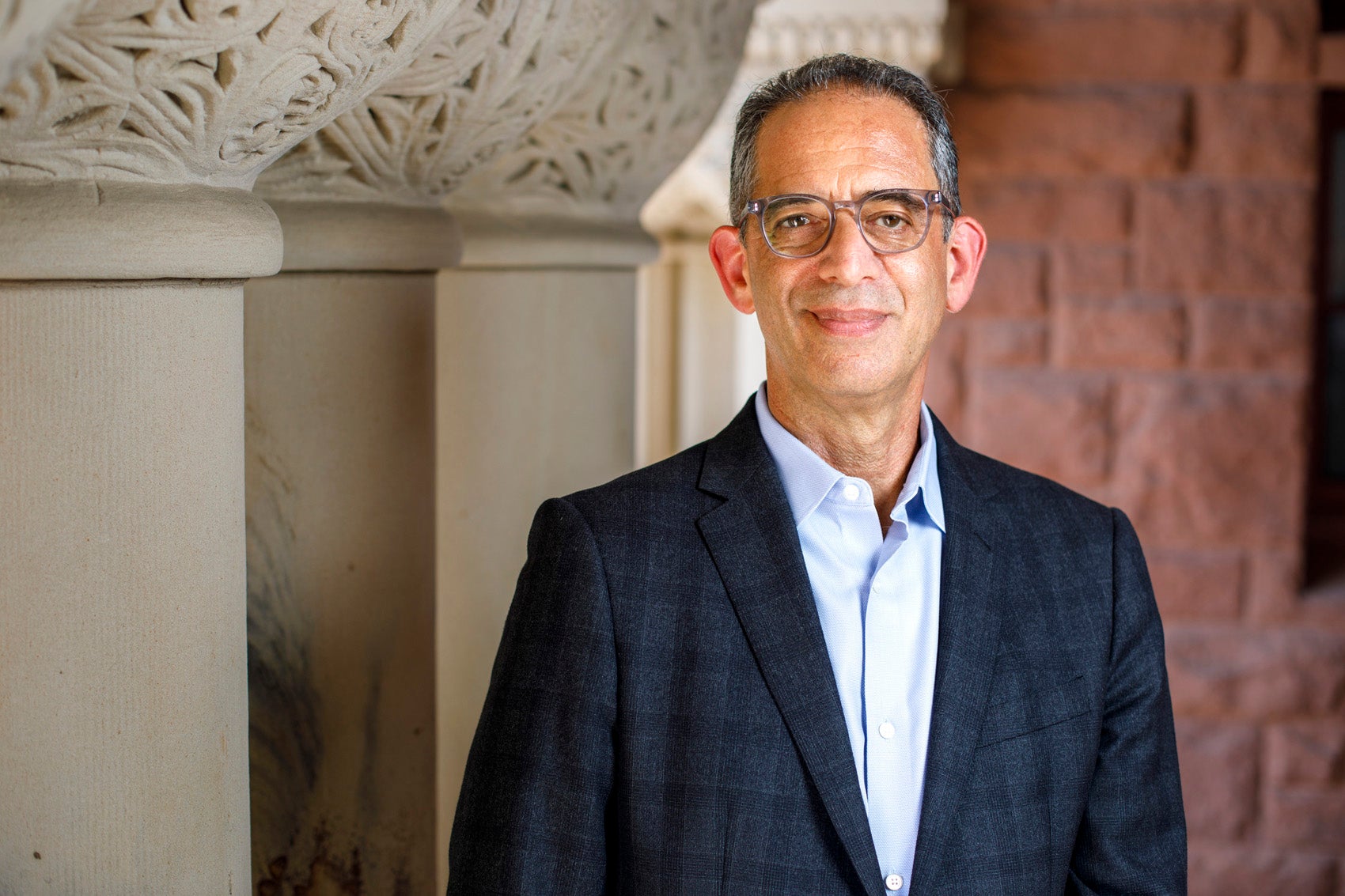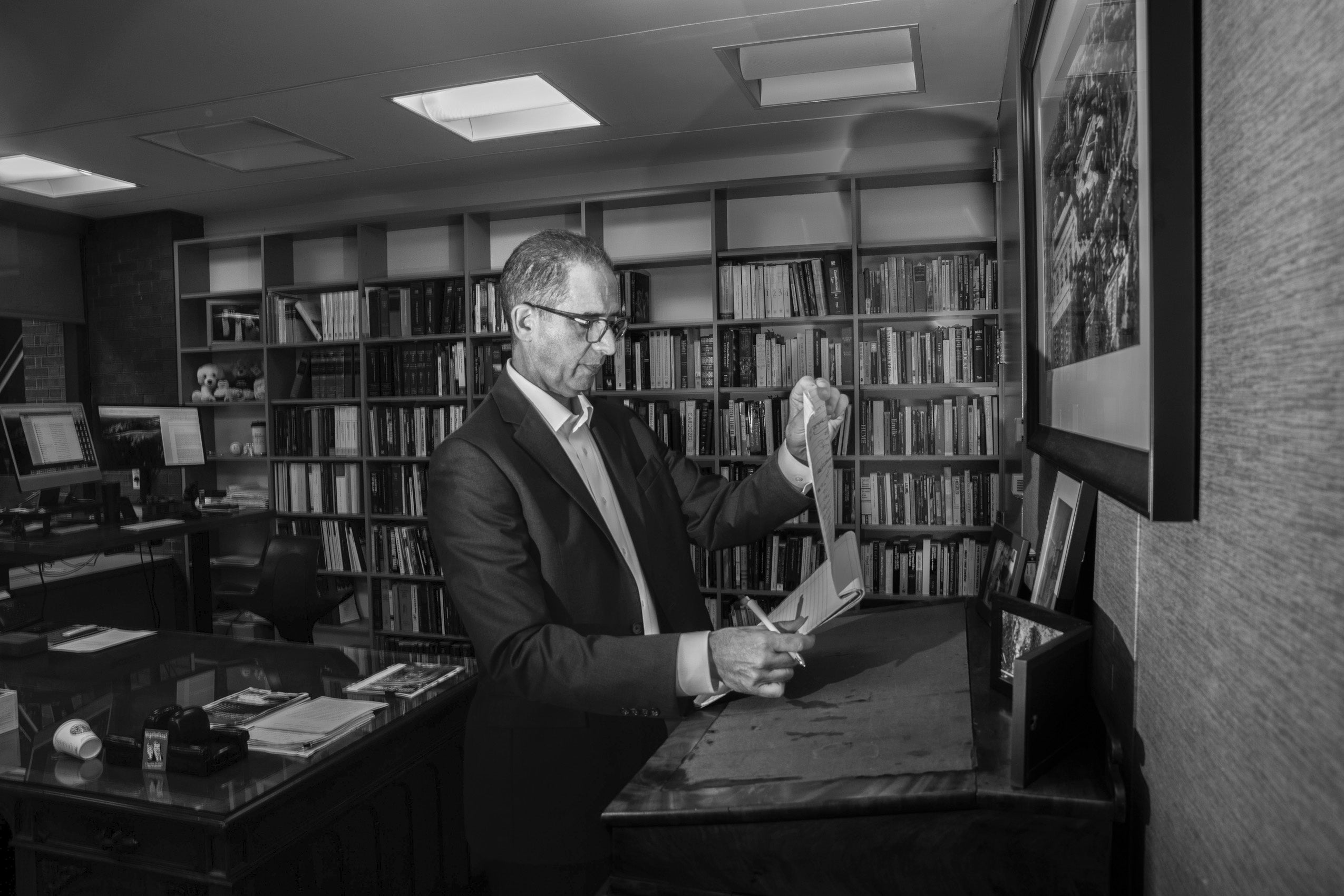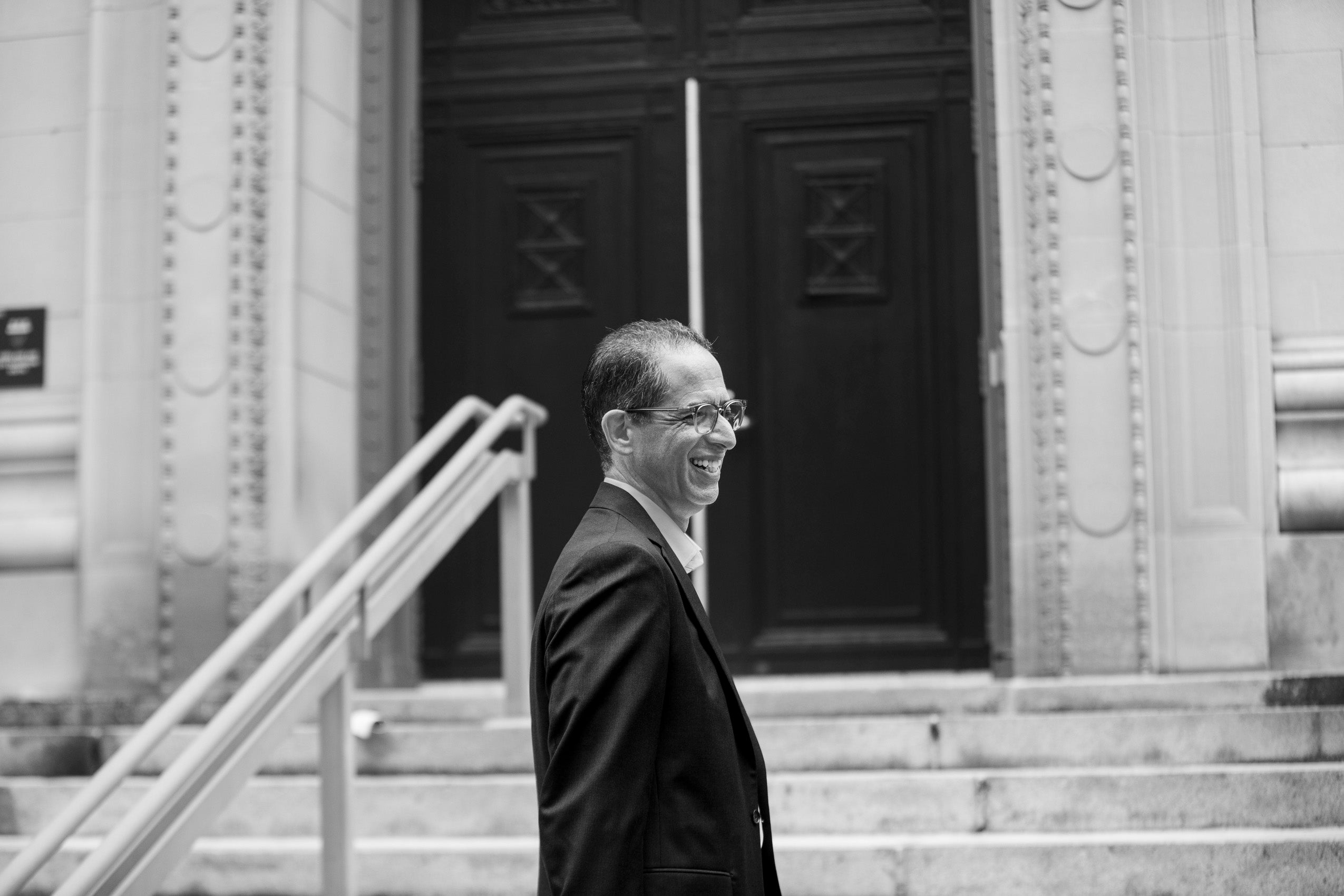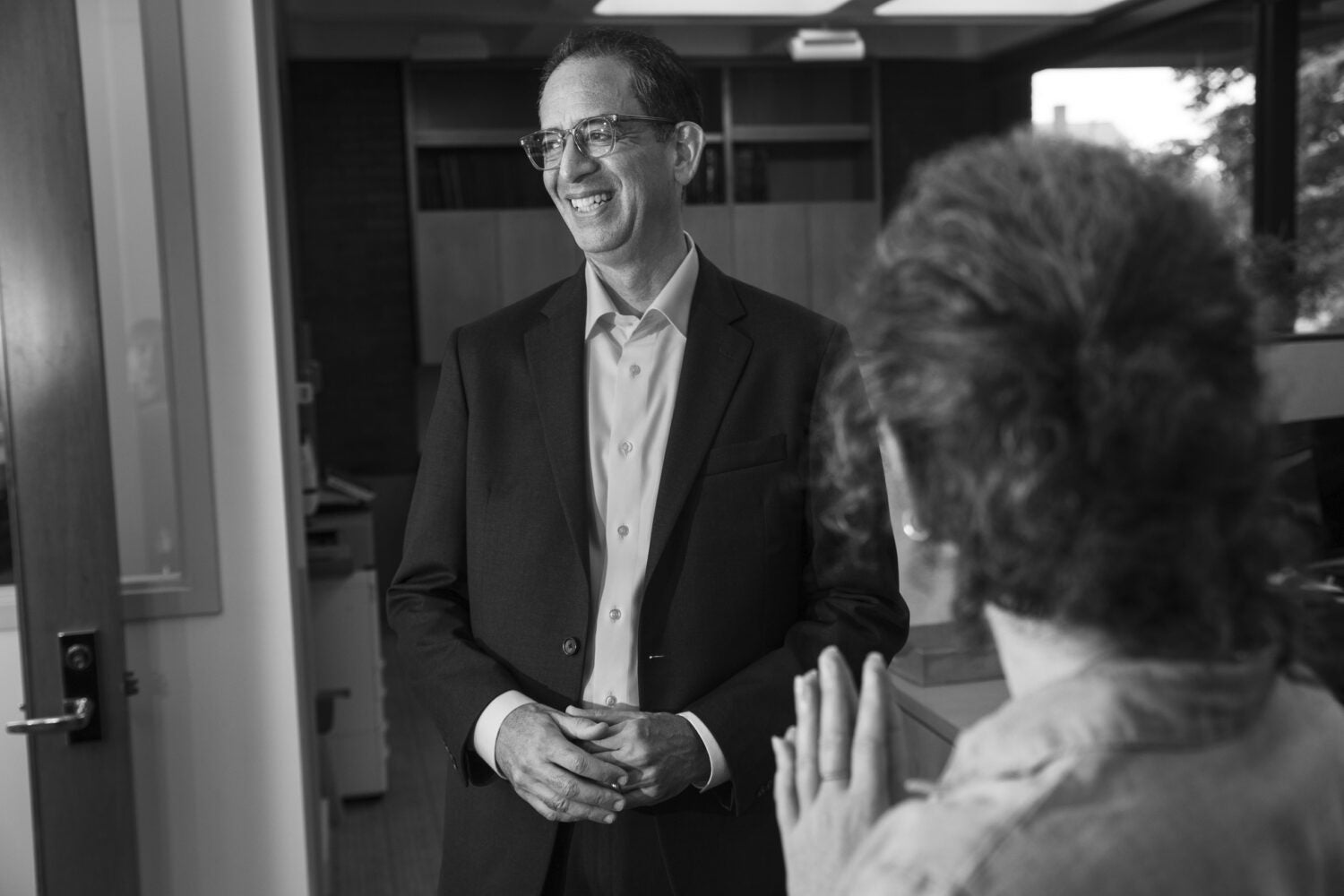In June, John C.P. Goldberg was named the Morgan and Helen Chu Dean and Professor of Law, having led Harvard Law School on an interim basis since March 2024. An expert in tort law, tort theory, and political philosophy, Goldberg joined the Harvard Law faculty in 2008 and served as the school’s deputy dean from 2017 to 2022, after serving on the Vanderbilt Law School faculty. He is co-author of “Recognizing Wrongs,” as well as a leading torts casebook, and has written dozens of articles on topics in tort law and tort theory.
In a recent conversation, Goldberg discussed his background, his approach to the law and legal pedagogy, his love of tort law, and why it’s teaching that gets him out of bed in the morning.
Harvard Law Bulletin: Let’s start at the beginning. Tell me about your childhood.

John Goldberg: I grew up on Long Island, about an hour outside of Manhattan. My dad was an English professor at SUNY Stony Brook. And my mom raised me and my sister while also running a gallery that featured local artists. So, I was introduced early on to ideas, literature, and art. My not-at-all-rebellious form of rebellion was to turn to law. My parents are no longer with us, but I’m truly grateful for all the love and support they gave me.
What was your focus in school as an undergraduate?
I went to Wesleyan University in Connecticut, where I enrolled in a program called the College of Social Studies. It’s a three-year major and is by design interdisciplinary, so you study economics, history, government, philosophy, all at the same time. It was very intense. When my friends went off to have a good time on Thursday nights, I often spent another hour or two sitting at my typewriter — yes, typewriter — banging out papers for the next day before joining them. It was demanding, but it taught me how to think and write.
You also attended Oxford.
Yes. After Wesleyan, I spent two years at Oxford doing an M.Phil. degree, a master’s degree. There, I was really focused on philosophy and political theory. And I got to work with some incredible scholars. I happened to be in St Antony’s College, an all-graduate college, which I liked both because I was a little older and because it attracted an international student body, so I got to know people from all over the world.
When did you decide to go to law school?
I was in yet another graduate school and I’d been working hard on philosophical issues and enjoying it, but also feeling increasingly like philosophy was a little abstract for my taste. A lot of the problems we were wrestling with didn’t feel like they had the texture of the real world. So, I went to law school thinking that I could merge my more philosophical interests with a more grounded, practical set of problems. I didn’t know if that was actually going to be true, because I didn’t know much about law. There were no lawyers in my family. Once I got to law school, I was delighted to discover that this “bet” paid off. Pretty much from day one, I was thrilled that every day we’d go into class and there’d be a nuanced, knotty, practical problem, that often, but not always, raised big, rich philosophical questions needing to be thought through.
Why torts?
The cases just grabbed me — reading the classic tort cases and thinking about the classic tort questions of who’s responsible after this terrible thing has happened. Like criminal law and some other subjects, torts can be a very difficult and, in some ways, depressing subject, because it’s about bad things happening to people and people doing bad things to each other. But I’ve always been fascinated by questions like: Is this your fault? Are you the one who should be held responsible? Are there many people who should be held responsible? How should we handle this both as a moral matter and as a legal matter?
And then you clerked for a couple of judges, including Supreme Court Justice Byron “Whizzer” White. What was that like?
I was incredibly lucky to have two wonderful experiences. I clerked on the Eastern District of New York for Judge Jack Weinstein, who was one of the inventors of modern mass tort litigation, and really was a pioneer and an incredible figure. He was on the Columbia Law faculty, and served in World War II in the submarine corps, and just had an amazingly accomplished career.
On Justice White, people may not know that the nickname “Whizzer” — which he hated, by the way — came from his days as a star football player. He played for the Detroit Lions and led the NFL in rushing for a couple of years. And he, too, served honorably in World War II. As a lawyer, he helped organize protection for the Freedom Riders during the Civil Rights Movement when he was working for Bobby Kennedy in the attorney general’s office. So, this is a person of extraordinary historical significance. He was a great boss. He engaged on the merits of the cases with us. We clerks had a really enjoyable experience working for him and trying as best we could to maybe push him a little bit this way or that and usually failing.

What lessons did you take from those experiences that stay with you today?
Probably the most important thing I took away from the two clerkships was the value of learning from people with different views. I don’t love labels like “liberal” or “conservative” because I don’t think they’re super helpful. But Judge Weinstein would be described by some as a liberal activist judge, and Justice White might be described as a conservative. And I thought both clerkships were fabulous, despite their different approaches to the law. I didn’t agree with either of them on half of what we did, and that doesn’t matter, because I was the clerk, and they were the judges. Engaging with each of them was just incredible.
You write and research a lot. Do you also enjoy teaching?
I love teaching. Let me say a couple of things about teaching generally at Harvard Law School, and then about myself. I started my academic career at Vanderbilt, a great school, with amazing colleagues. My colleagues there took teaching incredibly seriously. Then, I got the call from Dean Kagan saying, “Oh, come visit at Harvard.” I had just assumed that HLS was a big research institution where everyone was writing their articles, and nobody focused on teaching. And that was completely wrong. When I got here, I was really struck by how seriously the faculty take teaching and by the range of teaching styles — everything from full-blown Socratic method to more lecture-based. I’m in awe of how committed Harvard Law professors are to the enterprise of instruction.
Personally, what gets me out of bed in the morning is the chance to be in the classroom with the students and to hear what they have to say. Even if I’m teaching a case I’ve taught 20 times before, there’s a new perspective, a new angle, a new way of thinking about it, a new way of explaining it. And that’s as much the students as me. The dynamic quality of the classroom and seeing each class’s different perspective is so fun and invigorating. I really just love it.
What is your teaching style?
I experienced as a law student classic, hide-the-ball Socratic. That approach is pedagogically very valuable. It’s designed to help students see what they don’t know, and that’s a really important way to learn. But it’s not my preferred style. I try to use a combination of lecture and questioning. The lecture part aims to help everyone get on the same page and clear up a lot of potential confusions upfront, so we can have a better conversation that focuses on what I think are the really important issues.
You’ve been known to use humor in class, even when discussing serious topics. Are you funny in class?
You’ll have to ask my students that question. But I think humor can be an important element of instruction. At the same time, it comes with some risks. Because you can sound a false note, unintentionally, that throws people off or makes them uncomfortable. That’s inevitable in any interesting conversation. A conversation without some risks is likely to be a pretty boring conversation, and who wants that?
In Torts and any other law school class, there will inevitably be discussions of divisive, difficult issues. Lawyers have to figure out how to talk about them and how to reason through them, notwithstanding their difficulty, and notwithstanding the fact that people disagree strongly on them. There are various ways of doing that. And there are a lot of people around Harvard who spend their lives thinking about how to do that. But I do think humor is one valuable tool among many in addressing that very knotty problem.

Unlike some other graduate programs, law school really forces folks to engage in ideas they disagree with and see all sides of a question. I guess that is a central role of a lawyer.
Absolutely! Legal pedagogy historically has been very good at that, whether it’s being asked by a professor to play a particular role just for a particular discussion, or inviting students to give their sincere comments. Both professors and students are constantly testing out new ideas, including ideas lots of people don’t agree with, maybe for good reason. Few of us have fully formed views on everything such that we can just “press play” and spit out a perfectly coherent comment on a subject. We’re all engaged constantly in the enterprise of building and rebuilding and revisiting how we think and understand the world. Speech is experimentation, and it has to be understood as experimentation, particularly in the classroom. That doesn’t mean there’s license to be awful or irresponsible. But it does mean everyone has to have leeway to try things out. Because that’s how you figure out what you actually think.
You’ve led the school for nearly a year and a half now. What has that experience been like? Can you share any key lessons you’ve learned?
I feel like I’ve learned a ton about what it takes for a school this big and this complex to thrive. Of course, there is the stuff everybody sees: the teaching, the clinical work, the publications. But there is so much more — everything from facilities to IT to HR to the Registrar and Student Services, and of course an amazing staff that somehow, often behind the scenes, keeps things running smoothly. I guess the main takeaway for me has been that HLS is truly a collaboration: thousands of people — students, faculty, staff, alums — working together to maintain and improve this amazing institution. I can’t tell you how grateful I am for the pride and effort that everyone puts into their work on behalf of HLS.
I know it’s early days, but can you share a few of your priorities or plans or approaches for the future?
There is so much great stuff going on here that, as interim dean, I sometimes thought my main job was to make sure that it simply continued without interruption. The role of dean, of course, is different. We are living through a period of great uncertainty and transition affecting so many areas, from the future of higher education in this country to how AI will affect law schools and the legal profession. As a community, we will need to get to the bottom of these and many other questions and adapt thoughtfully (as Harvard Law School has done time and time again over the last two centuries) to ensure that we continue to lead in legal pedagogy and to attract the most talented students and the most accomplished faculty. In the months ahead, I’m going to continue doing a lot of listening — listening to my faculty and staff colleagues, to our students and our alumni — to hear their thoughts, their concerns, and their aspirations for our law school. There is a lot to do. And I expect I’ll have a lot more to say on these topics in the future. So, stay tuned.
This interview was edited for length and clarity.
